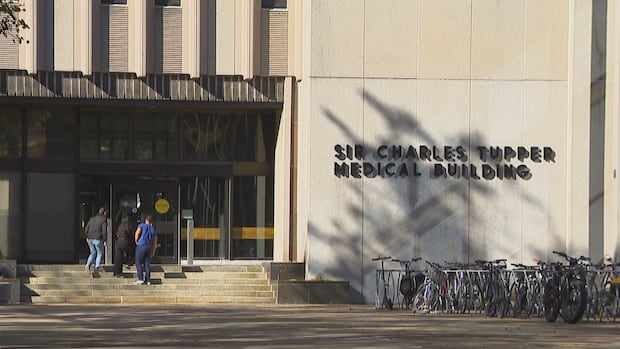Education
Dalhousie University Closes Anatomy Lab Due to Formaldehyde Concerns

Medical students at Dalhousie University in Halifax, Nova Scotia, will not engage in hands-on anatomy studies this year after the university’s anatomy lab was closed due to elevated formaldehyde levels. The closure follows air quality tests that revealed the lab’s formaldehyde concentrations exceeded provincial safety standards.
In a detailed letter to students, Dr. David Anderson, the dean of the faculty of medicine, explained that the lab, located in the Tupper Building, underwent testing over the summer. The results indicated that formaldehyde levels did not meet the current standards set by Nova Scotia. Despite attempts to rectify the situation by modifying the ventilation system, a second round of tests also returned unsatisfactory results.
“We understand that these changes have raised important questions, some that we do not have answers to at this time,” Dr. Anderson stated. He noted that the university is seeking ongoing guidance from occupational health and medical experts to address the issues. Dalhousie University has declined requests for further interviews regarding the situation.
Formaldehyde is a colorless chemical known for its pungent odor, often used as a preservative and disinfectant. It can cause irritation to the eyes, nose, and throat even at low concentrations, and is recognized as a carcinogen. Its presence is not limited to laboratory settings; formaldehyde can also be found in smoke and exhaust from cigarettes, fireplaces, and vehicles.
Dr. Anderson clarified that Nova Scotia adheres to formaldehyde thresholds established by the American Conference of Governmental Industrial Hygienists. This year marked the first formaldehyde testing conducted in a decade, and it was discovered that the acceptable limit had been lowered in 2017. The current threshold is set at 0.1 parts per million, a decrease from the previous 0.3 ppm standard.
While Dr. Anderson did not provide specific results from the testing, he mentioned that the Tupper Building laboratory’s levels were compliant with the former standards in Nova Scotia and the current regulations in New Brunswick. As a precaution, Dalhousie has suspended all work with specimens across its three medical school locations: Halifax, Cape Breton, and Saint John. Air quality testing is currently underway in the Saint John lab.
In light of the closure, medical students will adapt their learning methods this year. Instead of working directly with cadavers, they will utilize videos, skeletal materials, and anatomical models. Dr. Anderson believes this alternative approach will still fulfill the necessary learning objectives for the students.
Looking ahead, the university is exploring long-term solutions, which may include renovating the lab or sourcing specimens preserved with lower levels of formaldehyde. The Nova Scotia government has acknowledged the situation but emphasized that it is the responsibility of Dalhousie University to manage the resolution.
Despite the challenges, Dalhousie’s human donation program will continue to accept donations from across the Maritimes as the university navigates the next steps in addressing the lab’s air quality concerns.
-

 Politics4 weeks ago
Politics4 weeks agoSecwepemc First Nation Seeks Aboriginal Title Over Kamloops Area
-

 World5 months ago
World5 months agoScientists Unearth Ancient Antarctic Ice to Unlock Climate Secrets
-

 Entertainment5 months ago
Entertainment5 months agoTrump and McCormick to Announce $70 Billion Energy Investments
-

 Science5 months ago
Science5 months agoFour Astronauts Return to Earth After International Space Station Mission
-

 Lifestyle5 months ago
Lifestyle5 months agoTransLink Launches Food Truck Program to Boost Revenue in Vancouver
-

 Technology3 months ago
Technology3 months agoApple Notes Enhances Functionality with Markdown Support in macOS 26
-

 Lifestyle3 months ago
Lifestyle3 months agoManitoba’s Burger Champion Shines Again Amid Dining Innovations
-

 Top Stories2 months ago
Top Stories2 months agoUrgent Update: Fatal Crash on Highway 99 Claims Life of Pitt Meadows Man
-

 Politics4 months ago
Politics4 months agoUkrainian Tennis Star Elina Svitolina Faces Death Threats Online
-

 Sports5 months ago
Sports5 months agoSearch Underway for Missing Hunter Amid Hokkaido Bear Emergency
-

 Politics5 months ago
Politics5 months agoCarney Engages First Nations Leaders at Development Law Summit
-

 Technology5 months ago
Technology5 months agoFrosthaven Launches Early Access on July 31, 2025





















